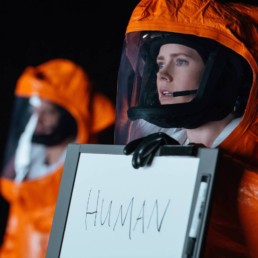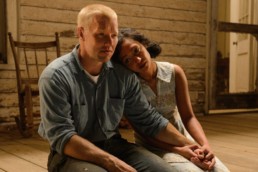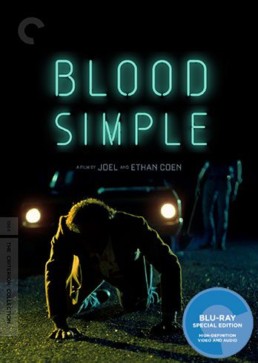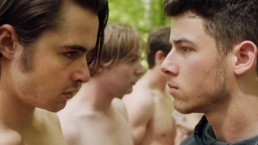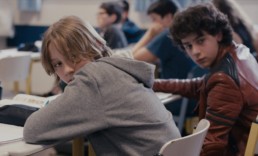'Arrival' Review: This Year's Smartest Sci-Fi Flick
With such searingly-laced dramas as 2013's Prisoners and in last year's more-blistering still cartel-drama Sicario, director Denis Villeneuve once again proves he is second to none in being able to craft an affecting human drama set in a consumingly dangerous world – and proves it here on his largest scale to date.
Inevitably, alien invasion movies must ask themselves – and their audience – the same critical question: What are they doing here? And yet, before this question can even be poised to alien life forms, the small hurdle of needing to teach word-based human language to an alien species of entirely symbol-based communication for which to even understand what a "question" is, must be developed. Good thing the world would have time for such a laborious undertaking and wouldn't likely be on the brink of planet-wide war.
This is the premise of Arrival, a multi-layered sci-fi movie that hinges its dramatics on a linguist's attempt to find a way to communicate with aliens amidst a ticking-time-bomb that is a Cold War standoff between international nations and extraterrestrials. Add to this a circular, non-linear time-space narrative that marries the unlocking of alien language to alternate realities, and Arrival stands as the smartest sci-fi offering of the year.
When twelve unidentified flying objects land – or more so, ominously hover – over the world, linguistics professor Dr. Louise Banks (Amy Adams) is called upon by Colonel Weber (Forest Whitaker) to aid the US military in figuring out how to communicate with Earth's newest visitors and uprooted from her rudimentary undergraduate teaching career. Seen to not be leaving any family behind, Louise gets choppered to the Montana landing site, where she meets another civilian-turned-top-security-cleared-specialist in physicist Ian Donnelly (Jeremy Renner). Yet as quickly as she is absorbed into this new world and its high-stakes stresses, so too do lapses of grief flare up, tied to memories of both her lost child and failed marriage, which the movie opens with in somber flashback, seeing the fleeting glimpses of a child's birth, through childhood, through ultimately being taken by disease at her side – leaving a now alone Louise to shuffle blindly into a new reality before cutting to present-day invasion.
https://www.youtube.com/watch?v=tFMo3UJ4B4g
Downloaded on their missions, Louise and Ian are shuttled up into the alien pod's entry doors when they open every eighteen hours, floating through the gravity-less pod to get to the chamber to communicate with the life forms inside. After a few unsuccessful trials, initial anxieties and fears subside and Louise is drawn closer to the aliens, eventually stripping away her oxygen suit to convey who her "self" is, leading to more breakthroughs in communication. Yet the closer she comes into proximity and contact with the aliens, more vivid do the fragmented memories of her daughter become, bringing Ian closer to support Louise and her lengthy teaching process which, let's not forget, runs counter to the timelines of both Colonel Weber and the world. Without giving much else away, Louise and Ian's relationship develops into what leads to the movie's largest idea of non-linear realities.
With such searingly-laced dramas as 2013's Prisoners and in last year's more-blistering still cartel-drama Sicario, director Denis Villeneuve once again proves he is second to none in being able to craft an affecting human drama set in a consumingly dangerous world – and proves it here on his largest scale to date. In Arrival, Villeneuve deafens the galactic-absurdity of alien life (yet still taps into fantastic imagery of the design of the aliens and their symbol based communication system) to ultimately show the resounding human drama underneath. Whether it be the intimate devastation of a mother who must manage the memory of a deceased child on one end to the conflict of worldwide human civilization needing to work together amidst a fractured modern landscape of language and politics before world war ensues, Villeneuve handles an entire range of drama to polished success.
Arrival, like Villeneuve's filmography, is pristinely photographed and operates in chillingly measured pace, and it's great fun to see the director maintain his human-drama talents while dipping his toes into the world of sci-fi – which, in its final act, ups the entire ante by unveiling the full stakes of the quantum time-leaping canvas: that unlocking the alien's language may lead to the discovery of alternate timelines that only Louise may be capable of unlocking to save humanity. If at that point, this reality-bending closer feels a bit rushed in having to wrap up all of the movie's loose ends, and where MacGuffins start to come sailing in like meteor showers, Arrival is still an expertly crafted film that lifts the sci-fi genre to even greater, more thoroughly constructed heights.
116 minutes. "Arrival" is rated PG-13 for brief strong language. In theaters this Friday.
'Loving' Review: The Quiet Hurt in the Price of Loving
Hollywood love stories are stuffed with such overly-romanticized plots – boy-meets-girl introductions, flamboyant declarations of love, impassioned embraces (be it in the rain or otherwise) – that they also take on a layer of artificiality in which the story of two people in love is all but lost.
Loving, in theaters today, is devoid of all types of fantastical conventions and cliches, standing as nearly a polar opposite and one of the year's most affecting love stories.
Based on a true story, Loving tells the story of Richard and Mildred Loving, a mixed-race couple living in the deep Virginian South in the late fifties whose union of marriage jails them and further threatens their civil liberties, setting up a seemingly uphill battle against them and the world. Except, here again, Loving doesn't position itself to work in the conventions of Richard and Mildred Loving to actively fight against their enemies, being the local townspeople, state police department, or Supreme Court.
So, if it's not a Hollywood romance, and it's not a social justice movie, then what exactly is this movie? Writer and director Jeff Nichols crafts Loving to be a love story unlike most others– a movie as naturally paced as the rhythm of the crickets in the field. Simply put – Nichols tells a story of two people in love with each other, and how in that love, all other factors act as peripheral. As this reviewer notes, it's as if even the movie is an unwarranted intrusion of their own relationship, speaking to their total humility.
What credits this movie to be so powerful? Well, Nichols' work is of course, commendable, allowing the story to be told with center-composed photography and medium-framed shots and effective use of lighting and shadows. But the real magic in Loving, which comes as no surprise, lies in the performances of Joel Edgerton and Ruth Negga.
With his bleached hair and yellowed teeth, Joel, in a career-best performance, tenderly shapes the character of Richard to be if not the most articulate Southerner, then certainly one with the purest of hearts, whose puppy-dog innocence doesn't consider that choosing to be with a woman of color is wrong for the times. His quiet but powerful depiction is beset by the winning performance from Ruth Negga as Mildred, who displays equal humility and captivates the screen with her enormous watery eyes and graceful performance. Those simple acts of looking at each other in the eyes and whispers of nighttime confessions are the heart of this movie.
There's a recurring sequence in Loving that may sum up the film, and should be looked out for. Richard's brick-laying work is returned to multiple times and may stand for his and Mildred's relationship as relating to the world. In Virginia, Richard slops concrete onto bricks, laying bricks at a dizzying and reckless speed (perhaps Richard is initially ignorant towards the society where he lives). After moving to Washington D.C., Richard lays bricks slowly, more precisely, with the intense focus of using his leveling tool (perhaps Richard is now fully aware of how he must tread lightly and follow rules precisely so). And finally, when the resolution comes in the film's final sequence... well, let's just say that a self-made string aligns the bricks he lays, perhaps symbolizing how Richard and Mildred ultimately created the rules for how they were to live their life.
'Loving' is rated PG-13 for thematic elements. Opens in theaters this Friday.
'Kids in Love' Review: Repeats the Same Kiddie Coming of Age Story
The funny thing about growing up, in the way that all punky teenagers tend to do, is that the anxiety-ridden tales of doing so are all largely the same. All defined by the same inconsequential uncertainties, heartbreaks, and consuming worries about the future and their place in it. Yet while these stories are all connected by this shared similarity, that doesn't mean that movies about this stage in life all have to fall into the trap of feeling the same as the rest of the Young Adult movies. Unfortunately, that's exactly what happens in the hip and youth-aimed drama Kids in Love.
An uninventive yet eye-pleasing story of across-the-pond youths being youthful, Kids in Love distances itself from its peers by quite nicely capturing the real look and feel of this self-important time of millennials growing up – credit that to it's cooly casual screenplay (penned by two youths themselves who also show up as part of the bratty pack) and its steady musical score. If Kids in Love feels largely unoriginal, it at least gets the tone and feel just right.
Kids in Love doesn't so much follow kids being in love as it does one kid, Jack (Will Poulter) – and not so much his being in love as his being a confused and anxious mess in the days after graduating high school and before the soul-draining world of Law School. It's pretty much as cliché as you'd think, including how his safely lived life is (you guessed it) upended when a beautiful pixie girl Evelyn (Alma Jodorowsky, granddaughter of film director Alejandro Jodorowsky) whisks him away from a volunteering gig to a night of costumes and dancing. She introduces him to the likes of such free-spirited friends as Voila (Cara Delevingne) who all dance around and smoke cigarettes in not one, but many of the film's music-driven montages. From there, it follows as familiar a storyline of turning away from his once-accepted responsibilities to pursue fun, his friends, and love.
https://www.youtube.com/watch?v=16Smpsx13Ao
Kids in Love may have a tougher time connecting with their target demographic of "kids" since it's really only the brooding Will whose story of confliction we are drawn to (again, screenwriters are two young chaps themselves). Perhaps Will getting closer to the exotic and alluring Parisian and taking pictures is a story, but it's all so tepid and singular that it's a bit of a mis-sell.
If you can forgive the lack of original storytelling and instead are looking for a pleasant hour and a half of watching attractive young people frolic through life, then Kids in Love will certainly satisfy. To that end, this movie is as real and affecting as it is the sulky teenager who may spring to watch it.
'Kids in Love' is not rated. 87 minutes. Now available on demand.
Coen Brothers' First Feature 'Blood Simple' Digitally Restored on Criterion Collection
While the Coen brothers may now be able to attract such A-list stars as Channing Tatum and Scarlett Johansson to their Oscar-geared films, the Academy-Award winning directing team began their careers far from Hollywood.
In fact, it would be an understatement to say that Joel (61) and Ethan (59) weren't among the forefathers of filmmakers who got their start by making movies outside of the studio system entirely, in the American independent filmmaking movement of the 80s.
And now, their first feature film, 1984's exploitation-horror inspired "Blood Simple," has been digitally restored and released by the Criterion Collection, out now on Blu-ray and DVD.
The Coen's directorial debut (of which Ethan is singularly credited as director and Joel as Producer, as it would be years before the Academy would recognize the pair as a legitimate directing team), a neo-noir about a love triangle and hitman has been was undertaken by the Criterion Collection from the original 35 mm negative, which was scanned in 16-bit 4K resolution. Color correction and restoration were supervised and approved by Joel and Ethan Coen, as well as director of photography Barry Sonnenfeld.
Take a look at what's loaded onto this fantastic special edition:
As a web exclusive, check out this storyboarding video that compares scenes from the film to their original storyboards, with commentary by Joel and Ethan Coen, cinematographer Barry Sonnenfeld, and actor Frances McDormand.before adding "Blood Simple" to your personal collection.

'Goat' is a Bold, Shocking Dramatization of Hazing in a Fraternity
If you were in a fraternity or sorority in college, you'll most likely agree: being in Greek life offers young adults the positive experience of creating lifelong bonds of brotherhood and sisterhood with their fellow students by way of sharing the same character-building and ethics-shaping experiences.
However, the darker and more dangerous sides of frat and sorority life– involving what happens when pledges and members, still in their latter-formative years and shaping their self-identities by seeking acceptance amongst their peers– are met with the new normal pressures of raucous partying that is so ingrained in Greek life. This can create inadvertent bonding experiences by testing their members by way of stressful, sometimes traumatic events. Experiences that former fraternity-rusher Brad Lands had in real life and documented in a memoir.
In "Goat: A Memoir," Lands chronicles his own experience of seeking safety in brotherhood by rushing Clemson University's Kappa Sigma chapter (after transferring when he was brutally jumped and assaulted in an unrelated incident at his previous school). The safety he seeks, however, proves elusive, as Lands and his fellow pledges are pushed to the brink of enduring a first-week hazing that, after a real-life devastation amongst a fellow pledge, forces Brad to confront what he is rushing for.
Lands' experience has been adapted into the film, "Goat," opening this Friday. One of the most buzzed-about films at this year's Sundance film festival for its unrelenting portrayal of youth partying, director Andrew Neel brings this tumultuous tale to the big screen.
After a dream-like slow-motion sequence of screaming shirtless young men in a possessed-pack mentality, we meet Brad (Ben Schnetzer) an incoming freshman who has just been jumped, car-jacked and left for dead. After recovering from injuries and the trauma-related stress, Brad circles to the idea of joining his year-older brother Brett (Nick Jonas) in college with plans of rushing the fictitious Phi Sigma fraternity. And hey–maybe it wouldn't be so bad to run with the popular crowd and meet beautiful young women and participate in all college has to offer.
As Brad quickly finds out, Phi Sigma, of which Brett is a top brother, is the most exclusive and coolest fraternity, meaning the rushing process is seriously meant to weed out anyone who might not be serious to join (Neel also makes the commentary that the level of hazing has grown year after year and arguably in its more prevalent state in this generation's college culture). And so, an already trauma-induced Brad attempts to prove his loyalty by enduring inhuman level treatment and hazing, including the consumption of alcohol, drugs, partying, and then the less than glamorous moments–being stripped of clothes, having waste poured on him, being forced to fight, and a backwoods event involving a goat that even former rushers assumed was myth in its fraternity's history of hazing (it should be repeated that while the events are based on true-life events, the reviewer is not categorically incriminating fraternity and sorority life of these events)
Andrew Neel directs with a fearlessness that makes these scenes feel coiled with the tautest tension and suspense for its audience. While Seth Rogen and Zac Efron portrayed college partying and pranking as a humorous and mostly slapstick event in "Neighbors" and its sequel of this year ("Neighbors 2: Sorority Rising”), "Goat" takes the absolute opposite approach of dramatizing the real-life vulgarity and violence to chilling effect.
Ben Schnetzer ("Snowden") gives an incredible performance in what is a physically and emotionally demanding role, telling a journey of Brad's initial introverted reluctance to participate in normal life, through his terrible and torturous treatment at the hands of the very people he is seeking to find brotherhood in which forces him to question whether he wants to call these people family. Nick Jonas lends a little more than star power as the more popular Phi Sigma brother, whose conscience is tested by witnessing his brother's treatment. James Franco makes a cameo as a former Phi Sig brother, indulging in a night of partying and passing out to unanswered calls from his wife and children asking his whereabouts in one of the movie's funnier scenes.
"Goat" is bold, shocking, and one of the most electric movies of the year. It's fearless and unapologetic in its dramatization and depiction of real-life events, which stands as a warning to young people of the reckless behavior that can influence them during the formative years of their life. While disturbing and unsettling, "Goat" should be essential viewing to remind us one of horrors that can arise by way of the deadly combination of pack mentality and a six-pack of beer (or, more).
'Goat' is rated R for disturbing behavior involving hazing, strong sexual content and nudity, pervasive language, violence, alcohol abuse and some drug use. 96 min. In theaters this Friday.
WWII Thriller 'Anthropoid' Tells Gripping Story of Assassination Attempt
For those unfamiliar with the deeper points of world history, "Anthropoid" might sound like something alien and out of this world. In actuality, "Operation Anthropoid" was the code name given for the assassination attempt of the infamous German SS officer Reinhard Heydrich, the main architect of the “Final Solution” (the Nazi plan to exterminate the Jewish people during World War II). The new film, simply titled "Anthropoid," opening in Los Angeles at the Landmark Theater this Friday, is a more slow-burning drama than edge-of-your-seat action thriller and tells the story of two fearless Czechoslovakian soldiers who attempted the assassination mission, an operation that would change Europe forever.
Based on actual events, this World War II thriller captures the grim and anxiety-ridden feelings of fear during that infamous period in world history; where danger looms around every street corner and in every untrustworthy individual met. The two rogue characters who must navigate these perilous waters are our main characters, Josef Gabcík (Cillian Murphy) and Jan Kubiš (Jamie Dornan), a pair of exiled soldiers who plan to assassinate Heydrich (Detlef Bothe), third in command from Hitler and the leader of the Nazi forces in Czechoslovakia.
"Anthropoid" opens with a series of title cards and historical footage that leads into Germany's rise to power with the signing of The Munich Agreement – a written pact agreed upon by Germany, France, the United Kingdom, and Italy that, in a simplified version of events, allowed Germany to invade and overtake Czechoslovakia (now regarded as a failed act of appeasement toward Germany).
Gabcík and Kubiš parachute into their now-occupied homeland, and – after a rendezvous with enemy spies – find shelter in the home of fellow Czechoslovakian-resistance supporters, including the beautiful Marie Kovárníková (Charlotte Le Bon) and Lenka Fafková (Anna Geislerová), who Gabcík and Kubiš fall for shortly. With their support, along with that of Uncle Hajský (Toby Jones) and a handful of others, Gabcík and Kubiš devise a plan that, after studying the daily transportation of the target Heydrich, they feel like they can strike in plain sight. Yet when an unexpected setback jeopardizes the mission, Gabcík and Kubiš are forced to go into hiding while they await news of the attempt, and ultimately must defend themselves against an outmatched Nazi army.
If "Anthropoid" drags for a few scenes in its second act, up until its truly amazing finale, a near twenty-minute-long shoot-out between the small Czechoslovakian band and the Nazi forces, it's to the credit of both Jamie Dornan and the always-enigmatic Cillian Murphy that the more human elements shine through. Dornan extends his range past his one-note dominator as Christian Grey in "Fifty Shades of Grey" to a fearful yet brave fighter, and Murphy offers weight and experience as the spear-headed leader of the mission.
"Anthropoid" will certainly be enjoyed more when thought of as a slow-burning drama rather than as an action-packed thriller as was 2008's Tom Cruise-starring "Valkyrie." Writer and director Sean Ellis should be commended for not only bringing such a gripping and lesser-known story of the assassination of the highest-ranking Nazi officials under Hitler's regime to light, but capturing the mood and tone of these paranoia-stricken times as well. All things considered, this tightly-wound drama will leave an impact on viewers, not only from its historical importance, but through Dornan and Murphy’s humanization of these characters, making this film and story feel even more remarkable.
'Anthropoid' is Rated R for violence and some disturbing images. 120 minutes. Opens this Friday at the Landmark Theater.
'Tony Robbins: I Am Not Your Guru' Captures Grandeur of Mega Self-Help Event
“Tony Robbins: I Am Not Your Guru,” a new documentary about the larger-than-life motivational speaker and communicator, will be watched by three different types of people: the first, of course, will be Robbins' ever-devout fans and followers, who most likely will praise the movie for its very existence. The second type of person will be the cynical, critical person, arguably having a pre-loaded bias or thought of Robbins as more huckster than a savior.
The third type of person, someone who might find themselves more comfortable in the middle, will no doubt get the most out of what this movie has to offer.
From Academy Award-winning director Joe Berlinger, the man behind such seminal non-fiction documentaries as the "Paradise Lost" trilogy and "Metallica: Some Kind of Monster" (the latter film, which Robbins approved of in getting this documentary made), trades in his darker, more investigative documentary exposé for something unapologetically hopeful, choosing to show the more uplifting side of Robbins' work rather than a take-down approach. On that note, those looking for a deeper, more personal, profile of Robbins may be left unsatisfied.
Those who are looking for a peek behind the curtains of one of the most famous self-help events, however, will have more than enough footage to take in here. Covering the six-days of Robbins’ famous "Date With Destiny" at a convention center in Boca Raton, Florida (a hop-skip-and-jump away from his oceanside mansion), more than 2,500 people from 71 different countries excitedly await their own personal life-changing transformations.
https://www.youtube.com/watch?v=HUHMZf3qwsQ
At about $5,000 a ticket for the weeklong event, Anthony "Tony" Robbins, (though he would prefer "life-strategist") has built his empire on loyalty, charisma, and results. Standing at an immense 6'7" with a gravelly voice and fixed gaze (while dropping profanity-laden language to snap people into the present moment), Tony’s work is the epitome of tough love by calling people out on the things they are choosing not to confront.
At one hour and fifty-five minutes, “I Am Not Your Guru” shows the entire gamut of the seminar. Condensed down from twelve hours a day to a highlight reel of select participants sharing their stories of hardship and traumatic pasts (try not to think anything of the fact that the people who make the cut are mostly attractive women), it is the raw emotion and vulnerability of the crowd that offers real moments of honesty. Horrific scenes of childhood sex slavery, suicidal thoughts, and the general feeling of being unloved are just some of the issues brought up here, most of which Robbins relates to with his own abused past.
Now, back to the overarching uneasiness that a self-help documentary might inspire: people will take whatever they wish out of a movie like this, depending on what they are looking for. Objectively, documentaries are thought to be real when they are without personal bias, rather than amplifying a certain side of a story. In this regard, Berlinger is unapologetic about how he portrays his subject, intending to highlight the good a film like this can bring. In an industry of ever-growing takedown documentaries that seek out the bad in the world, Berlinger attempts to be among the minorities of good-hearted and inspiring films.
What is entirely undeniable, however, is that Tony helps people in need of help, seemingly telling them the things that they already know but in his trademark will-power framed mindset. Perhaps Robbins is as divisive as he is because what he's selling might be smoke and mirrors: is the idea of happiness an illusion? Is willing yourself to be happy delusional? Does it last beyond the six-day event? And if it works, does it really matter?
As Christian Bale's Batman says at the end of 2008's "The Dark Knight" in response to a series of crimes that have been pinned on the caped crusader, "Sometimes, the truth isn't good enough. Sometimes people deserve more. Sometimes, people deserve to have their faith rewarded."
"Tony Robbins: I Am Not Your Guru" is unrated, but features strong language. 115 minutes. Now streaming on Netflix.
Gondry's Playful 'Microbe and Gasoline' Gets Existential With Adolescence
In his latest scaled-down effort, the ever-imaginative Michel Gondry infuses his childlike curiosities with his DIY art production in this story about boyhood friendship.
There's a thing about movies dealing with adolescence which becomes even truer when that movie is made from the point of view and from the voice of an adolescent: it takes a person who is still connected to that time in childhood that captures the teetering naivete and tottering maturity. Michel Gondry, director of such visually wonderful films as "Eternal Sunshine of the Spotless Mind" and "The Science of Sleep" is one of those directors that can write such characters and get such candidly authentic performances, which is seen here in his latest movie.
"Microbe and Gasoline," Gondry's latest small-scale effort, is a movie about Gondry's childhood selves, arguably. Thoughtful and quiet artist Daniel (Ange Dargent), hunches over his sketches of punk rock friends and is consumed by such age-appropriate matters as sex and death. He catches the attention of a few girls in class with his write-up about his punk rocker painting art show, but is all-the-same dismissed by the rest of the kids for his smallish build, landing the nick-name "Microbe."
https://www.youtube.com/watch?v=KtmsmPt01jQ
Enter the new kid in school – Théo (Théophile Baquet), or "Gasoline" as he is soon called, for the smell of gas from his motor scooter (assembled from his dad's antique shop – a great excuse for Gondry to feature practical effects). Both recognizing the other as individuals in a sea of monotony, they soon find a kinship and bond over the things that completes the other: Daniel's a little less self-assured than the goofier outsider Théo, and also draws pictures of punk rockers while Théo asserts himself as a punk rocker in real life. Daniel complains that his mother loves him too much, Théo complains that his mother doesn't love him enough. Daniel romanticizes his own emotional pangs because he comes from a strong family unit, while Théo shrugs off pain, arguably because of his own fractured family life. And so, Microbe and Gasoline's ideas take them everywhere, leading them both to ponder freedom – which takes the form of assembling a type of playhouse/car (a garden shed with wheels and a motor) to road trip through France.
"Microbe and Gasoline" covers a range of genres, working as a buddy movie, road movie, and collective coming-of-age movie. But it's also effortless and airless as a movie that's simply about the pleasures of friendship and connection and voicing and discovering affirmations about adult living that they are embarking on. If "Microbe and Gasoline" comes up short in any department, it might be that it's just a little too timid for its own good, and doesn't broaden itself out to make any larger statement about anything other than youthful angst. In less inspired writing, the "dumb jocks" are literally the villains here (Gondry doesn't miss the opportunity to have Théo asset that "today's bullies are tomorrow's victims"). In the film's latter part, which feels about twenty minutes too long, Gondry ends up casting out final lines of half-baked philosophical threads, which ultimately weigh the film down and make the audience lose sight of the magic that first made them friends.
"Microbe and Gasoline" is essentially Gondry's love letter to childhood and life, and maybe one of his most personal movies yet.
"Microbe and Gasoline" is rated R for some sex-related material involving young teens. 105 min. Now playing.

